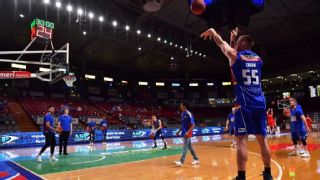|
The ball caroms off the back of the iron, and Mitch Creek is away. With ball in hand, he takes a dribble and surveys the lay of the land. Three opponents backpedal furiously into defensive position. Yet a part of them knows that resistance is futile. Mitch Creek is coming. The imaginary play cycles through Creek's head as he rampages towards the basket. He knows he'll beat that first defender, a lumbering big man cross-matched in transition. The second defender? Another big rotating over. "Too slow - I can get past him," Mitch Creek tells ESPN. "No matter who it is, in my mind, you cannot guard me." It's a snapshot of what Creek internalises in his mind, diligently mapping the terrain well before the play unfolds. He allows us to meld into his thought process for the briefest of moments, and what he sees in front of him in this impromptu scenario. "I'm too quick," Creek says of what he sees. "I'm too good at getting through gaps, and contorting. And I'm too strong. And I can finish with both hands, both sides of the floor, that you can't stop it." No, you can't stop him. Nor can you stop the Adelaide 36ers.  Creek is the embodiment of what the 36ers have become: A brash, confrontational, pugnacious squad going straight for the jugular. They're confident, they're snarling, and they're having an absolute ball running up scores against the rest of the NBL. "For what we do, you can't find a better player," 36ers head coach Joey Wright tells ESPN. "We want to play up-and-down. He's one of the fastest players all round. He's a tough kid that's not going to back down. We want to have that perseverance. He can go out and play defence in multiple positions. For our system, he's a perfect player." Creek has also become the emotional lodestone for the 36ers, galvanising a nascent team that was considered too young, too inexperienced to threaten just two seasons ago. Now, they're the most feared outfit outside Melbourne United. No team in the NBL plays at a faster pace; no team rams the ball down their enemy in transition -- even after opposition makes -- with more virulent force than Adelaide, harnessing the well of energy exuding from Creek. He's a tangled bundle of nerves -- a hyperactive, motorcycle-riding, darts-playing, adrenaline junkie who plays only at the fastest cadence. "He's never sitting down," Wright says. "He can play a multitude of positions. We play him one through four throughout the season, and different games. He defends a bunch of different guys. He's high energy, same as he is off the court." Creek's now got the confidence, the swagger, and the awareness that the game is played as much in the head as it is on the court. Yet it wasn't always this way. Creek still remembers the kid who used to hate the game of basketball, running around with his hands in his pockets in under-8s competition. It wasn't until his mum sewed up the pockets -- forcing him to actually use his hands to touch the ball -- that his love for the game blossomed. There were hurdles to overcome, doubts and aspersions cast over his ability during his formative years. Creek politely stonewalls when asked about the barbs that went his way, but his response reveals a seething undercurrent that drives him to this day. "A lot people said that I was never going to be good enough," he says. "I couldn't do this. I couldn't do that."  Watching from the outside, there's a barely concealed rage every time he steps onto the court, fuelled by a Russell Westbrook-like chip on his shoulder. He remembers every slight that's been thrown his way, every single person who thought he'd never amount to anything as a basketball player. It gives him the little extra motivation he needs to get through those 11pm workouts. Pull up jumper after pull up jumper. Left-hand hooks. Right-hand hooks. There's a reason he's working so hard. Yet there's also a maturity to his thinking now. He's doing this for himself, and for his team. "You can't always just be angry," Creek tells ESPN. That emotional maturity is perhaps the greatest development in Mitch Creek's arc. No longer is he here to prove people wrong; he's here to get better, and help his teammates get better. Joey Wright has witnessed the transformation of Creek, from talented swingman to fully formed two-way stardom. The only person holding Mitch Creek back was Mitch Creek himself. "When I first got there, he was a bit insecure and he felt like he had to prove to people he was a certain type of player," Wright says. Creek admits that he was a completely different person a few years ago. He battled confidence issues and barely communicated within the team. "I didn't say a word," he says. "I wasn't the person I am today. Everything about me was different." Countless hours were spent with the club's sports psychologists examining mindfulness and building a deeper understanding of himself -- not of who he was, but of who he wanted to be -- which proved to be transformative. An appreciation of the mental state beckoned, and how the game is played as much in your head as it is between the white lines. Creek is no longer the talented player who spent precious energy second guessing himself, whose battles were within his mind as much as on the court. "Now," Wright says, "he just goes out and plays and whatever happens, happens." "I'm not fazed anymore about what people have to say about me," Creek says. "I've heard enough things that are true. And I've heard enough things that aren't. And when I get worried about either of those, then it just takes away from my own development."  Understanding the mental state has enabled greater overall awareness for Creek. Instead of focusing on himself, he's able to see the greater need of the team. And he's not afraid of confrontation, a necessary trait in leadership. "I actually relish it," he says of confrontation. "And I enjoy it because it puts your manhood to the test." Case in point, he won't hold back on a teammate if he sees something he doesn't like. Miss a defensive assignment? Creek will be all over you. Not make the extra pass? You'll hear about it. For Creek, it's not personal. He wants to see his teammates succeed because they're family; it's a form of tough love. "I'm not always right," Creek tells ESPN. "But I'm not afraid to be wrong,". On the flip side, he'll take a Joey Wright bullet for a teammate, a dressing down in front of the team, knowing full well that it fosters trust and greater accountability among the playing group. "He will dive in a deep hole with a buddy to save him," Wright says. "He will do anything for a teammate." Conversely, his mastery of the mental game now extends to the opposition. Creek excels at taking the opposition out of their comfort zone. He sees it as a form of mental warfare in which he zeroes in on a perceived enemy weak link and seeks out any mental and physical edge he can get. Run through them in transition when they aren't looking. Cut them under the ribs. Take a shot at them on a screen. Sure, they might shrug it off the first time. But can they sustain the barrage? "I know there's certain people that break when it's like that," Creek says. "I know certain people can put on a façade that 'hey, this is fine, you can do this all day to me.' But I know deep down who can do it, and who can't." Call it mind games. The roles are reversed now. Mitch Creek has built up his mental fortitude and resilience. Have you? "As soon as you start talking to me, I know you're distracted from what you need to be doing," Creek says. "As soon as I'm in your head? That's fine. I've already won."  What stays in Creek's head are the memories that he despises. Losing to Illawarra in last year's finals series, despite home court advantage, hurts. "That makes me so mad," says Creek. It felt like a wasted year. You can bet it fuels the team's motivation to perform this year under the bright lights of playoff basketball. So, what lessons were learned from last year? "We've got to just remember that we're defence first, offence second," Creek says. "When we do that, we're in a good place" Creek finds himself in a good place. He knows his game, and he's comfortable within his own skin. He's playing within a system tailor-made for his gifts. He also knows the illustrious history of the 36ers, and how much a title would mean. Who knows? Maybe that shot at a title comes within a few weeks. "Our basketball is really simple," he says. "If we got stops, we can run. If we run, we're very hard to stop." You can bet Mitch Creek has already mapped this all out in his mind. He's coming. The 36ers are coming. Just remember, you probably won't be able to stop him.
|
